EXPERT
Locations
DOWNLOAD
Transregional Threats Journal
Venezuela Series • Volume 1 • Issue 4
Venezuela’s Crime-Terrorist Convergence
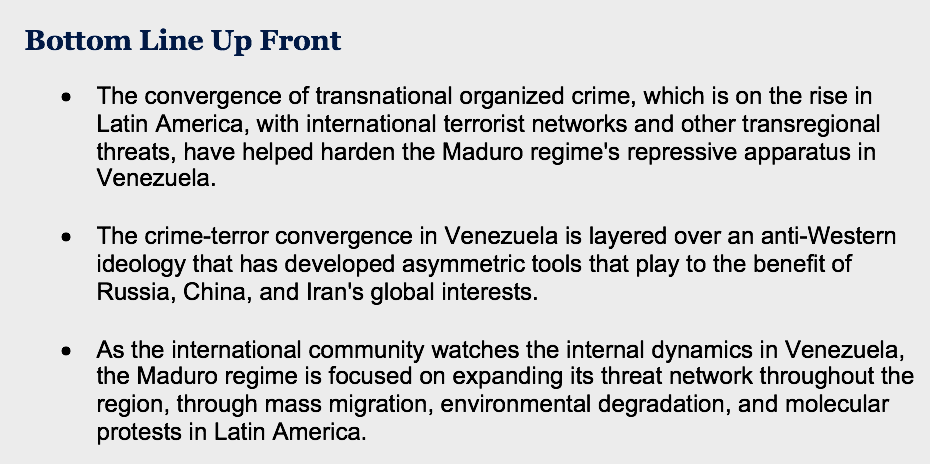
The current U.S. national security strategy, unveiled by President Trump in 2017 a year after taking office, is focused on global strategic competition with key adversaries, including, China and Russia, who challenge American power, influence, and interests worldwide.[i] But it does not end there. The strategy also highlights trans-regional threat groups, from Islamist terror networks to transnational criminal organizations, who are actively trying to harm Americans around the world.
Iran, as the world’s leading state sponsor of terrorism, is at the heart of America’s counterterrorism challenge and its proxy Hezbollah has increasingly tapped into drug trafficking and illicit finance channels as another revenue stream to fund its efforts in Lebanon, Syria, and elsewhere.[ii] These global threats are converging through logistical networks that have a safe haven in Venezuela. Beginning with Hugo Chávez and now under Nicolás Maduro, a slew of service providers have found fertile territory in Venezuela to provide a variety of services, such as accounting, banking, technology, transportation, etc. to major drug cartels from Colombia, Mexico, and Bolivia, to Italy and Spain.[iii] International terrorist groups have tapped into this same logistical network in Venezuela that has support from the state.[iv] These are two of the three overlapping circles illustrated in Figure 1 that have made Venezuela the global hub of the convergence of threat networks that are propping up the Maduro regime.
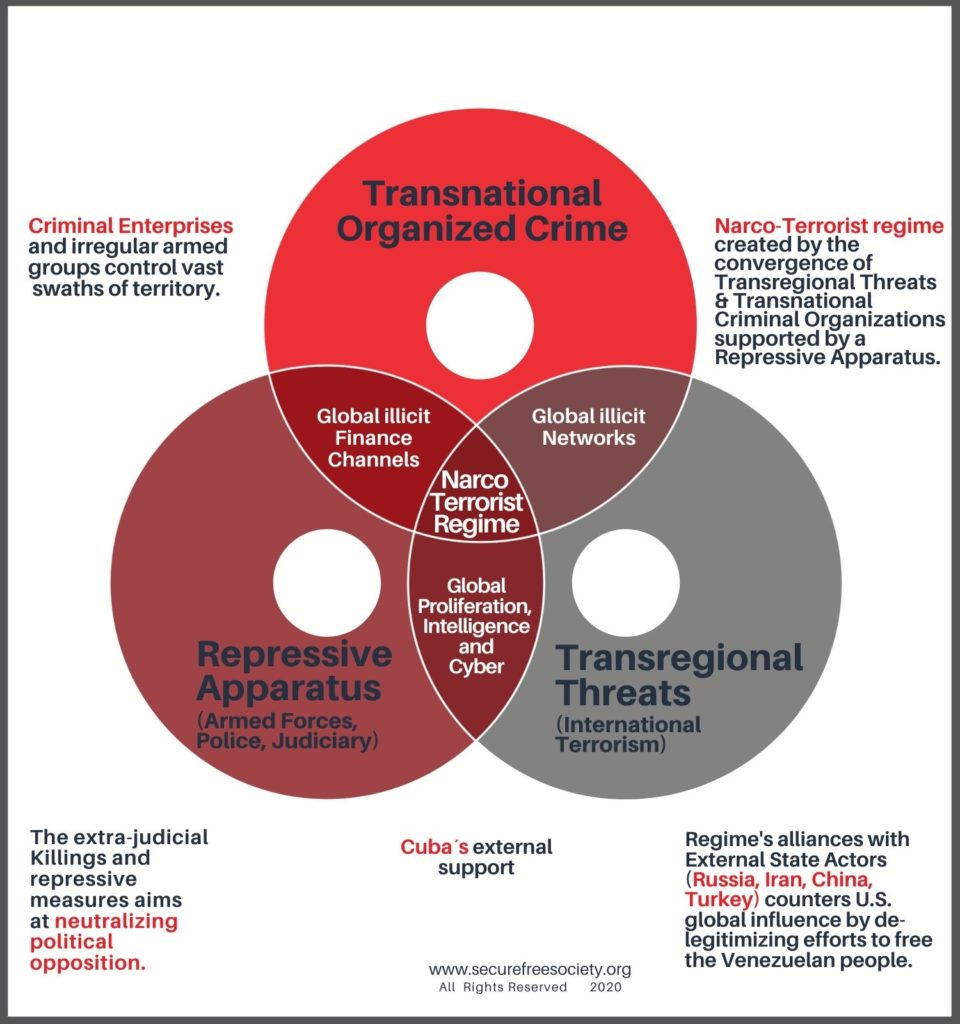
TRANSREGIONAL THREATS AND EXTERNAL STATE ACTORS
The fight for the freedom of Venezuela has formed two blocs around the globe: those who support the Maduro regime and those who oppose it.[v] Among those who still recognize Maduro, taking the lead are Russia, China, and Iran, who use the Venezuela crisis to counter U.S. influence in the Americas. All three of these External State Actors (ESA) have increased their presence in Venezuela in recent years and publicly denounce the U.S. “maximum pressure” campaign against the Maduro regime.
Seemingly one-sided, this alliance is mutually beneficial. Russia has made more than $11.4 billion selling military equipment to Venezuela in the last 15 years[vi] and China has sold more than $615 million in weapons to Venezuela in the previous ten years.[vii] Russian military equipment includes fighter aircraft, attack and transport helicopters, air defense and naval platforms, tanks, armored personnel carriers (APC), self-propelled artillery, and, as depicted in Figure 2, a variety small arms to include surface-to-air missiles.[viii] Complimentary, Chinese weaponry includes K-8 trainer aircraft and VN-16 light tanks, as well as anti-tank missiles, self-propelled mortars, self-propelled rocket launchers, and armored vehicles.[ix] Some of this equipment was actively used in repressing student and opposition protests against the Maduro regime in 2014, 2017, and to this day.
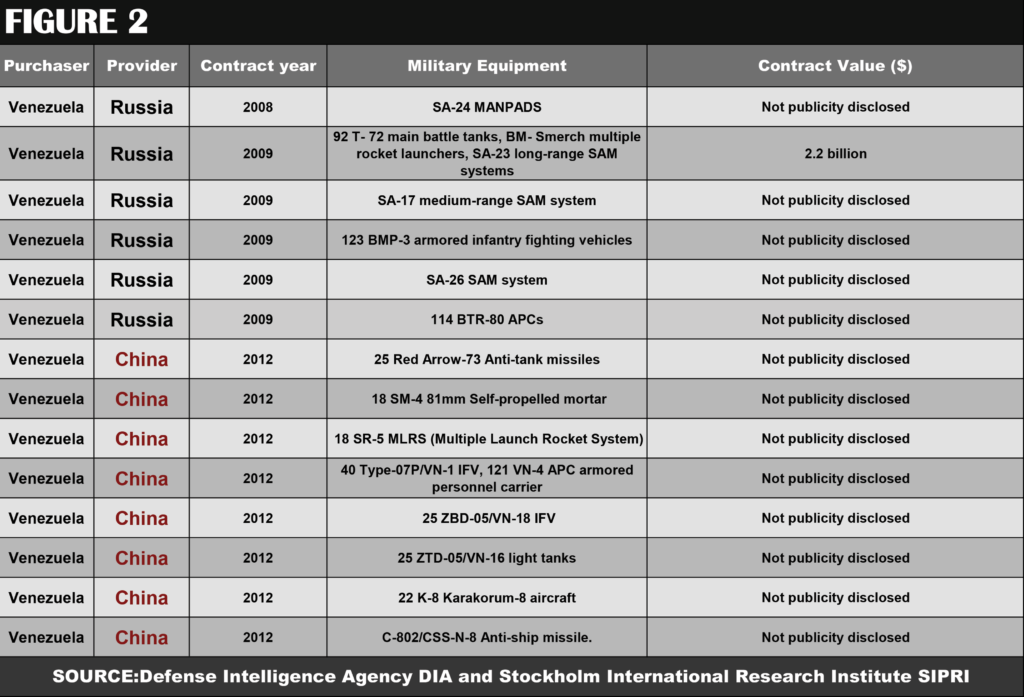
More recently, private Russian military contractors, with reported ties to the Kremlin, are being used to beef up security for Nicolás Maduro, according to Reuters.[x] Moreover, Russian officers have been reported to use Venezuelan military uniforms in the capital city, Caracas,[xi] as well as in the Mining Arch (Arco Minero) of Bolivar state,[xii] and in Tachira state along the Colombia-Venezuela border.[xiii] This Russian military on-the-ground presence in Venezuela is augmented by military aircraft continually arriving since 2018.[xiv]
While Moscow provides the manpower, Beijing provides the technology. Chinese telecom giants with strong ties to the military intelligence apparatus of the People’s Liberation Army (PLA) have helped the Maduro regime improve its surveillance capabilities.[xv] In 2018, ZTE Corporation, sanctioned by the U.S. for its role in espionage and cybersecurity risks, helped the Maduro regime build a surveillance system that monitors citizen behavior through the “fatherland card,” a new national ID in Venezuela.[xvi] This China-style social control complements a known People’s Liberation Army offshoot at the Captain Manuel Rios military airbase in Guárico state that tracks Venezuela-operated, Chinese-built satellites in orbit.[xvii]
In 2020, Iran’s military network, which used to play a covert role in Venezuela, came out of the shadows despite U.S. and international sanctions.[xviii] In April, the Islamic Revolutionary Guards Corps (IRGC) preferred airline, Mahan Air, designated by the U.S. as a material supporter of terrorism,[xix] began flying in technicians and equipment to revive Venezuela’s oil industry controlled by Minister Tareck El Aissami.[xx] The Maduro regime paid for this service with more than 9 tonnes, an estimated half a billion dollars, in gold bars taken from Venezuela’s vaults to the Islamic Republic.[xxi] Iran then upped the ante in May by sending five tankers filled with about 1.5 million barrels of fuel to Venezuela and attempted to send an additional four re-flagged tankers that were stopped off the coast of West Africa and have been seized by the United States.[xxii] According to the Department of Justice (DOJ), these fuel shipments were arranged by the IRGC.[xxiii]
The dual-use nature of Iran’s commerce, which is increasingly co-opted by the IRGC, questions the real purpose of the recent “humanitarian” support Iran is sending to the Maduro regime. A concern that grew as an Iranian supermarket “Megasis” opened this past July in Caracas in coordination with Maduro’s military-run emergency food program, called CLAP.[xxiv] This year has shown the Maduro regime openly interact with the world’s leading state sponsor of terrorism.
According to the State Department’s 2019 Country Reports on Terrorism, Maduro and his associates have fostered a permissive environment for terrorist groups, including dissidents of the Revolutionary Armed Forces of Colombia (FARC-D), the Colombian National Liberation Army (ELN), and Hezbollah sympathizers.[xxv] These terrorist groups facilitate regime corruption through illicit finance and graft schemes that include members of Venezuela’s armed forces and local organized armed groups.
A range of criminal activities, such as drug trafficking, extortion, smuggling, and illegal mining of gold and other minerals, has bankrolled the Maduro regime, which permits the presence of armed non-state actors, such as the ELN and the FARC-D, in Venezuela. These regional terrorist groups are controlling vast swaths of Venezuelan territory, particularly in the mineral-rich Arco Minero and along the Colombian border, connecting the regime to transnational organized crime.
TRANSNATIONAL ORGANIZED CRIME AND THE MADURO REGIME
The Maduro regime plays a critical role in the international drug trade serving as a transit point, which fetches around $39 billion on the streets of America, according to an estimate by the United Nations Office on Drugs and Crime.[xxvi] This has attracted major regional cartels to Venezuela, such as Mexico’s Sinaloa cartel, Honduras’ Cachiros, Colombia’s Los Rastrojos, Bolivia’s Cocaleros, and of course the ELN and the FARC.[xxvii] According to several DOJ indictments, the Maduro regime conspired with all these cartels through its own military-run drug network called the Cartel of the Suns to essentially “flood” the United States with cocaine.[xxviii]
William Brownfield, former assistant secretary of state for counter-narcotics and U.S. ambassador in Venezuela, regarded the Maduro regime as, “probably the most corrupt government in the entire world. It is worse than a narco-state. It’s a narco-state, but on steroids.”[xxix]
Key to these criminal networks is what is known in the national security lexicon as “super facilitators,” who manage illicit networks in various countries across continents. Alex Saab, a Colombian businessman and Maduro’s special envoy to Iran, currently detained in Cape Verde, is one of many financial and logistical architects, a “super facilitator” for the Maduro regime.[xxx] Saab’s criminal network is embedded with Venezuelan state-run programs, such as the CLAP food distribution program, that have been sanctioned for its wide-scale corruption.[xxxi]
The U.S. Treasury’s Financial Crimes Enforcement Network (FinCEN) warned about transactions involving Venezuelan government agencies and State-Owned Enterprises (SOEs), particularly those engaged in government contracting since they can be used as vehicles to launder and conceal embezzled funds[xxxii]. Venezuelan SOEs, under the Maduro regime, have created global illicit finance channels to move and hide an unprecedented amount of criminal proceeds and plunder state resources—money stolen from the Venezuelan people, which contributes to the dire humanitarian situation in Venezuela.
A REPRESSIVE APPARATUS
Under Cuban military advisors, Venezuela refashioned its national security and intelligence agencies into a service that spies on its armed forces, instilling fear and paranoia and repressing dissent.[xxxiii] According to the United Nations Human Rights report, the regime’s Special Action Forces or FAES act as “death squads,” killing 6,856 people from 2018 to mid-2019.[xxxiv] The report also states that the actual number of deaths could be much higher. It cites accounts by independent groups who report more than 9,000 killings for “resistance to authority” over the same period.[xxxv] Extra-judicial killings are repressive measures by the Maduro regime aimed at neutralizing political opposition and quelling dissent within the ranks.
Some of the most notable cases are through the regime’s state police, the Bolivarian National Intelligence Service (SEBIN), who assassinated lawmaker Fernando Alban with total impunity.[xxxvi] Naval Captain Rafael Acosta, who hours before his death, appeared in court with irrefutable evidence of having been tortured,[xxxvii] and Police Captain Oscar Pérez are among the most high profile military and law enforcement officers killed at the hands of the vicious state security forces.[xxxviii] Thousands of others have been killed or unlawfully detained by Maduro’s repressive security apparatus.
From 2014 to 2020, Foro Penal, a Venezuelan human rights organization, recorded 15,177 politically motivated detentions with numerous cases of torture and other cruel, inhuman, and degrading treatment by the Maduro regime in Venezuela.[xxxix] Figure 3 shows that students and youth are the most vulnerable population group to the repressive apparatus of the regime and that military and law enforcement serve the longest time in state prisons. The Maduro regime simultaneously releases groups as it detains others, maintaining a constant number of detainees to avoid drawing attention to the overwhelming number of arbitrary arrests. Foro Penal has labeled this tactic the “revolving door effect.[xl]

The Maduro regime’s control of key institutions, namely the judicial system in Venezuela, has prompted the international community to push back against the regime’s repression through punitive actions, to include multilateral sanctions. The United States, Canada, the European Union, and Switzerland have imposed targeted sanctions on more than 100 Venezuelan officials implicated in human rights abuses in Venezuela.[xli]
U.S. ACTION AGAINST CONVERGENCE IN VENEZUELA
The Trump administration has upheld its national security strategy, taking several actions against Maduro’s crime-terror convergence in Venezuela. In January 2019, the U.S. began its “Maximum Pressure” campaign against the regime, transitioning from targeted individual sanctions to sector-wide sanctions on banking, gold, and oil, to add to previous sanctions on the transportation and financial services sectors, including Venezuela’s state-backed cryptocurrency, Petro.[xlii] To date, there are 165 individuals and entities sanctioned by U.S. Treasury’s Office of Foreign Assets Control (OFAC) in Venezuela, on top of the six sector-wide sanctions against the Maduro regime.[xliii]
Many analysts point to the fact that OFAC sanctions can limit the Maduro regime’s formal sources of revenue, namely from oil exports; however, it does not necessarily cut off the illicit revenue sources from narcotrafficking, illegal gold mining, and other criminal activities.[xliv] To remedy this, the U.S. Southern Command (USSOUTHCOM), along with 22 partner nations, launched a massive counter-narcotic operation in the Caribbean in March that in four months has seized 122 metric tons of cocaine and 18,000 pounds of marijuana.[xlv] This achievement was highlighted in July when President Trump visited USSOUTHCOM in Miami, FL, where Admiral Craig Faller pointed out that nearly $2 billion in drug profits were denied to TCO’s many of which transit through Venezuela paying a high premium to the Maduro regime.[xlvi]
While separate from executive action, the DOJ equally has made a dent in Maduro’s crime-terror networks by announcing criminal charges in March against 15 regime officials, to include Nicolas Maduro, Diosdado Cabello, Tareck El Aissami, and Vladimir Padrino Lopez, who make up the high command of the Bolivarian revolution and are the leaders of the regime-controlled Cartel de Los Soles.[xlvii] The DOJ indictments accentuated how Venezuelan institutions such as the judiciary, the military, and the constituent assembly are criminalized. Moreover, it pointed out that Chavista dissidents are not necessarily divorced from the illicit activities propping up the regime.
The indictments in March provided the context to understand the criminal nature of the Maduro regime. But another indictment in May against a former member of Venezuela’s National Assembly, the Syrian-Venezuelan Adel El Zebayar, illuminated the regime’s ties to terrorist organizations.[xlviii] Described as a weapons-for-cocaine scheme, the charges against El Zebayar allege that the Cartel of the Suns served as a broker between Hezbollah, Hamas, and the FARC, all designated as foreign terrorist organizations by the State Department.[xlix]
A GLOBAL HUB
The convergence of transnational organized crime, which is on the rise in Latin America, with international terrorist networks and other transregional threats, have helped harden the Maduro regime’s repressive apparatus in Venezuela. Equally, the regime’s acquiescence toward this convergence has expanded the reach and scope of global illicit actors that use Venezuela to build logistical networks that benefit criminal enterprise.
While threat convergence theory describes the nature of Maduro’s narco-terrorist regime, it does not explain its strategic objectives.
The crime-terror convergence in Venezuela is layered over an anti-Western ideology that has developed asymmetric tools that play to the benefit of Russia, China, and Iran’s global interests. All the while, Cuba, with a sizable military contingent in Venezuela, continues to manage the day-to-day operations with the Maduro regime because of its comparative advantages in language, culture, counterintelligence, and knowledge of Russian and Chinese military systems. These ESAs have helped the Maduro regime amplify its capabilities, namely in cyber, intelligence, surveillance, and disinformation, manipulating the international community through openly discussing dialogue and political posturing for local elections in Venezuela.
As the international community watches the internal dynamics in Venezuela, the Maduro regime is focused on expanding its threat network throughout the region, through mass migration, environmental degradation, and molecular protests in Latin America.
With more than 5 million refugees, Venezuela’s humanitarian crisis increasingly destabilizes neighboring countries, allowing illicit networks to expand access and control of territory.[l] This crisis further undermines democratic institutions and exacerbates corruption region-wide. In today’s asymmetric battlefield, illicit networks substitute modern conventional armies in rogue regimes pursuit of regional hegemony. For the Maduro regime, replicating new narco-terrorist regimes in Latin America is its most potent response to the U.S. “maximum pressure” campaign and, by consequence, expands the influence of Russia, China, and Iran in the Western Hemisphere.
Notes
[i] “President Donald J. Trump Announces a National Security Strategy to Advance America’s Interests.” The White House. December 18, 2017. https://www.whitehouse.gov/briefings-statements/president-donald-j-trump-announces-national-security-strategy-advance-americas-interests/.
[ii] Humire, Joseph. “Financial nexus of terrorism, drug trafficking, and organized crime.” March 20, 2018, p. 14. https://www.securefreesociety.org/research/congressional-hearing-financial-nexus-of-terrorism-drug-trafficking-and-organized-crime/.
[iii] Farah, Douglas and Caitlyn Yates. “Maduro’s Last Stand.” IBI Consultants and the National Defense University, May 2019, p. 21.
[iv] Zamost, Scott, Drew Griffin, Kay Guerrero, and Rafael Romo. “Venezuela May Have given Passports to People with Ties to Terrorism.” CNN, February 14, 2017. https://www.cnn.com/2017/02/08/world/venezuela-passports-investigation/index.html.
[v] While there are 57 nations worldwide that have recognized and diplomatically support Interim President Juan Guaido, there are approximately 100 nations, mostly in the Non-Aligned Movement, that still recognize Nicolás Maduro as the head of state for Venezuela.
[vi] Litvinova, Daria.“Russia in Venezuela: As Moscow accuses U.S. of ‘information war,’ what Is Putin’s role in the standoff?” CBS News. May 1, 2019. https://www.cbsnews.com/news/russia-in-venezuela-why-vladimir-putin-backs-nicolas-maduro-in-standoff-with-donald-trump-us/.
[vii] Seligman, Lara. “U.S. Military Wary of China’s Foothold in Venezuela.” Foreign Policy.” April 8, 2019. https://foreignpolicy.com/2019/04/08/us-military-wary-of-chinas-foothold-in-venezuela-maduro-faller-guaido-trump-pentagon/.
[viii] Defense Intelligence Agency. “Report Russia Cuba Nicaragua Venezuela Security Cooperation (Unclassified).” Department of Defense. February 4, 2019.
[ix] “2020 Venezuela Military Strength.” Global Fire Power. https://www.globalfirepower.com/country-military-strength-detail.asp?country_id=venezuela.
[x] Tsvetkova, Maria and Anton Zverev. “Exclusive: Kremlin-linked contractors help guard Venezuela’s Maduro.” Reuters. January 25, 2019. https://www.reuters.com/article/us-venezuela-politics-russia-exclusive-idUSKCN1PJ22M.
[xi] Barráez, Sebastiana. “Militares rusos utilizan el uniforme venezolano en Caracas y la frontera.” Infobae. September 8, 2019. https://www.infobae.com/america/venezuela/2019/09/08/militares-rusos-utilizan-el-uniforme-venezolano-en-caracas-y-la-frontera/.
[xii] “Crece la presencia militar rusa en Venezuela: al menos 40 soldados llegaron a Canaima con uniformes de la Fuerza Armada Nacional Bolivariana.” Infobae. December 11, 2019. https://www.infobae.com/america/venezuela/2019/12/11/crece-la-presencia-militar-rusa-en-venezuela-al-menos-40-soldados-llegaron-a-canaima-con-uniformes-de-la-fuerza-armada-nacional-bolivariana/.
[xiii] Barráez, Sebastiana. “Misterio en la frontera de Venezuela y Colombia: soldados rusos se trasladaron a Táchira en misiones desconocidas.” Infobae. January 14, 2020. https://www.infobae.com/america/venezuela/2020/01/14/misterio-en-la-frontera-de-venezuela-y-colombia-soldados-rusos-se-trasladaron-a-tachira-en-misiones-desconocidas/.
[xiv] In December 2018 an Antonov-124 heavy cargo aircraft and an Ilyushin-76 transport aircraft carried out flights between Russia and Caracas. Another Ilyushin-76 was in Caracas later in the month. All three aircraft belong to the Russian air force.
[xv] “Venezuela creates smart card to get China-style social control.” Tomonews. November 22, 2018. https://us.tomonews.com/venezuela-creates-smart-card-to-get-china-style-social-control-3735338.
[xvi] Berwick, Angus. “How ZTE helps Venezuela create China-style social control.” Reuters. November 14, 2018. https://www.reuters.com/investigates/special-report/venezuela-zte/.
[xvii] Barbosa, Rui C. “Chinese Long March 2D Launches Venezuela’s VRSS-1 Satellite,” NASASpaceFlight.Com (blog), September 29, 2012. https://www.nasaspaceflight.com/2012/09/chinese-long-march-2d-launches-vrss-1/.
[xviii] Armes, Christina. “Iran’s military network comes out of the shadows in Venezuela,” PanAm Post. July 25, 2020. https://panampost.com/christina-armes/2020/07/24/irans-military-network-comes-out-of-the-shadows-in-venezuela/.
[xix] “Treasury Designates Iranian Commercial Airline Linked to Iran’s Support for Terrorism.” U.S. Department of the Treasury. October 12, 2011. https://www.treasury.gov/press-center/press-releases/Pages/tg1322.aspx.
[xx] Lobel, Oved. “Iran Doubles Down in Venezuela.” AIJAC.” July 15, 2020. https://aijac.org.au/fresh-air/iran-doubles-down-in-venezuela/.
[xxi] Laya, Patricia and Ben Bartenstein. “Iran Is Hauling Gold Bars Out of Venezuela’s Almost-Empty Vaults.” Bloomberg. April 30, 2020. https://www.bloomberg.com/news/articles/2020-04-30/iran-is-hauling-gold-bars-out-of-venezuela-s-almost-empty-vaults.
[xxii] Faucon, Benoit and Viswanatha, Aruna. “U.S. Seizes Iranian Fuel Cargo for First Time.” Wall Street Journal. August 13, 2020. https://www.wsj.com/articles/u-s-seizes-iranian-fuel-cargoes-for-first-time-11597352574
[xxiii] “Warrant and Complaint Seek Seizure of All Iranian Gasoil Aboard Four Tankers Headed to Venezuela Based on Connection to IRGC.” U.S. Department of Justice. July 2, 2020. https://www.justice.gov/opa/pr/warrant-and-complaint-seek-seizure-all-iranian-gasoil-aboard-four-tankers-headed-venezuela.
[xxiv] Talley, Ian. “Iranian Military-Owned Conglomerate Sets Up Shop in Venezuela.” Wall Street Journal. July 5, 2020. https://www.wsj.com/articles/iranian-military-owned-conglomerate-sets-up-shop-in-venezuela-11593972015.
[xxv] “Venezuela.” United States Department of State (blog). https://www.state.gov/reports/country-reports-on-terrorism-2019/venezuela/.
[xxvi] Walsh, Nick Paton, Natalie Gallón, and Diana Castrillon. “Corruption in Venezuela has created a cocaine superhighway to the US.” CNN. April 17, 2019. https://www.cnn.com/2019/04/17/americas/venezuela-drug-cocaine-trafficking-intl/index.html.
[xxvii] “Drug Trafficking within the Venezuelan regime: the Cartel of the Suns.” InSight Crime. May 17, 2018. https://www.insightcrime.org/investigations/drug-trafficking-venezuelan-regime-cartel-of-the-sun/.
[xxviii] “Nicolás Maduro Moros and 14 Current and Former Venezuelan Officials Charged with Narco-Terrorism, Corruption, Drug Trafficking and Other Criminal Charges.” U.S. Department of Justice. March 26, 2020. https://www.justice.gov/opa/pr/nicol-s-maduro-moros-and-14-current-and-former-venezuelan-officials-charged-narco-terrorism.
[xxix] Moreno, Jaime. “‘Take This Humanitarian Disaster in Venezuela Seriously’ Says Ambassador Brownfield.” Diálogo Americas. December 31, 2019. https://dialogo-americas.com/articles/take-this-humanitarian-disaster-in-venezuela-seriously-says-ambassador-brownfield/.
[xxx] Humire, Joseph. “Iran, Turkey, and Venezuela’s Super Facilitator: Who Is Alex Saab?” Center for a Secure Free Society. June 30, 2020. https://www.securefreesociety.org/research/who-is-alex-saab/.
[xxxi] “Treasury Disrupts Corruption Network Stealing from Venezuela’s Food Distribution Program, CLAP.” U.S. Department of the Treasury. July 25, 2019. https://home.treasury.gov/news/press-releases/sm741.
[xxxii] “Updated Advisory on Widespread Public Corruption in Venezuela.” Financial Crimes Enforcement Network. May 3, 2019. https://www.fincen.gov/resources/advisories/fincen-advisory-fin-2019-a002.
[xxxiii] Berwick, Angus. “Special Report: How Cuba taught Venezuela to quash military dissent.” Reuters. August 22, 2019. https://www.reuters.com/article/us-venezuela-cuba-military-specialreport/special-report-how-cuba-taught-venezuela-to-quash-military-dissent-idUSKCN1VC1BX.
[xxxiv] “UN Human Rights Report on Venezuela Urges Immediate Measures to Halt and Remedy Grave Rights Violations.” OHCHR. July 4, 2019. https://www.ohchr.org/EN/NewsEvents/Pages/DisplayNews.aspx?NewsID=24788.
[xxxv] Cumming-Bruce, Nick. “Venezuela Forces Killed Thousands, Then Covered It Up, U.N. Says.” New York Times. July 4, 2019. https://www.nytimes.com/2019/07/04/world/americas/venezuela-police-abuses.html.
[xxxvi] Smith, Scott and Fabiola Sanchez. “Venezuela opposition says lawmaker’s death was assassination, not suicide.” Global News. October 9, 2018. https://globalnews.ca/news/4528238/venezuela-fernando-alban-nicolas-maduro/.
[xxxvii] “‘Tortured’ Venezuela Captain’s Burial Angers Wife.” BBC News. July 11, 2019. https://www.bbc.com/news/world-latin-america-48949723.
[xxxviii] “Was Óscar Pérez Murdered? You Could Help Us Find Out.” The New York Times. May 13, 2108. https://www.nytimes.com/2018/05/13/opinion/oscar-perez-venezuela-forensic-architecture.html.
[xxxix] “Report on Repression in Venezuela.” Foro Penal. August 24, 2018. https://foropenal.com/en/report-on-repression-in-venezuela/.
[xl] Ibid.
[xli] “World Report 2020: Rights Trends in Venezuela.” Human Rights Watch. December 11, 2019. https://www.hrw.org/world-report/2020/country-chapters/venezuela.
[xlii] Seelke, Clare Ribando. “Venezuela: Overview of U.S. Sanctions.” June 2, 2020, 3.
[xliii] Ibid.
[xliv] Rendon, Moises and Claudia Fernandez. “Can Sanctions on Venezuela Be Improved?” CSIS. June 22, 2020. https://www.csis.org/analysis/can-sanctions-venezuela-be-improved.
[xlv] Torres, Nora Gamez. “Trump Vows to ‘Fight for Venezuelans’ at Visit to US Southern Command.” Military.com. July 10, 2020. https://www.military.com/daily-news/2020/07/10/trump-vows-fight-venezuelans-visit-us-southern-command.html.
[xlvi] “Remarks by President Trump in Briefing on SOUTHCOM Enhanced Counternarcotics Operations.” The White House. July 10, 2020. https://www.whitehouse.gov/briefings-statements/remarks-president-trump-briefing-southcom-enhanced-counternarcotics-operations/.
[xlvii] “Nicolás Maduro Moros and 14 Current and Former Venezuelan Officials Charged with Narco-Terrorism, Corruption, Drug Trafficking and Other Criminal Charges.”
[xlviii] “Former Member Of Venezuelan National Assembly Charged With Narco-Terrorism, Drug Trafficking, And Weapons Offenses.” U.S. Department of Justice. May 27, 2020, https://www.justice.gov/usao-sdny/pr/former-member-venezuelan-national-assembly-charged-narco-terrorism-drug-trafficking-and.
[xlix] Ibid.
[l] “Situación Respuesta a Los Venezolanos.” Response for Venezuelans. https://r4v.info/es/situations/platform.

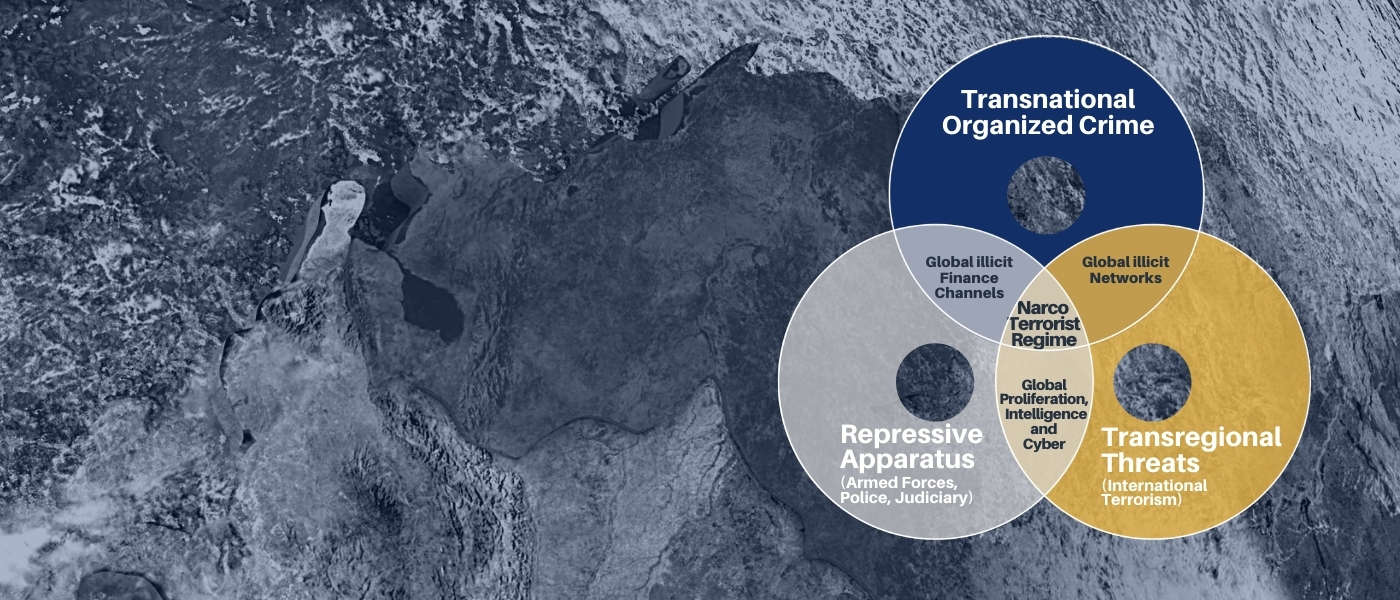
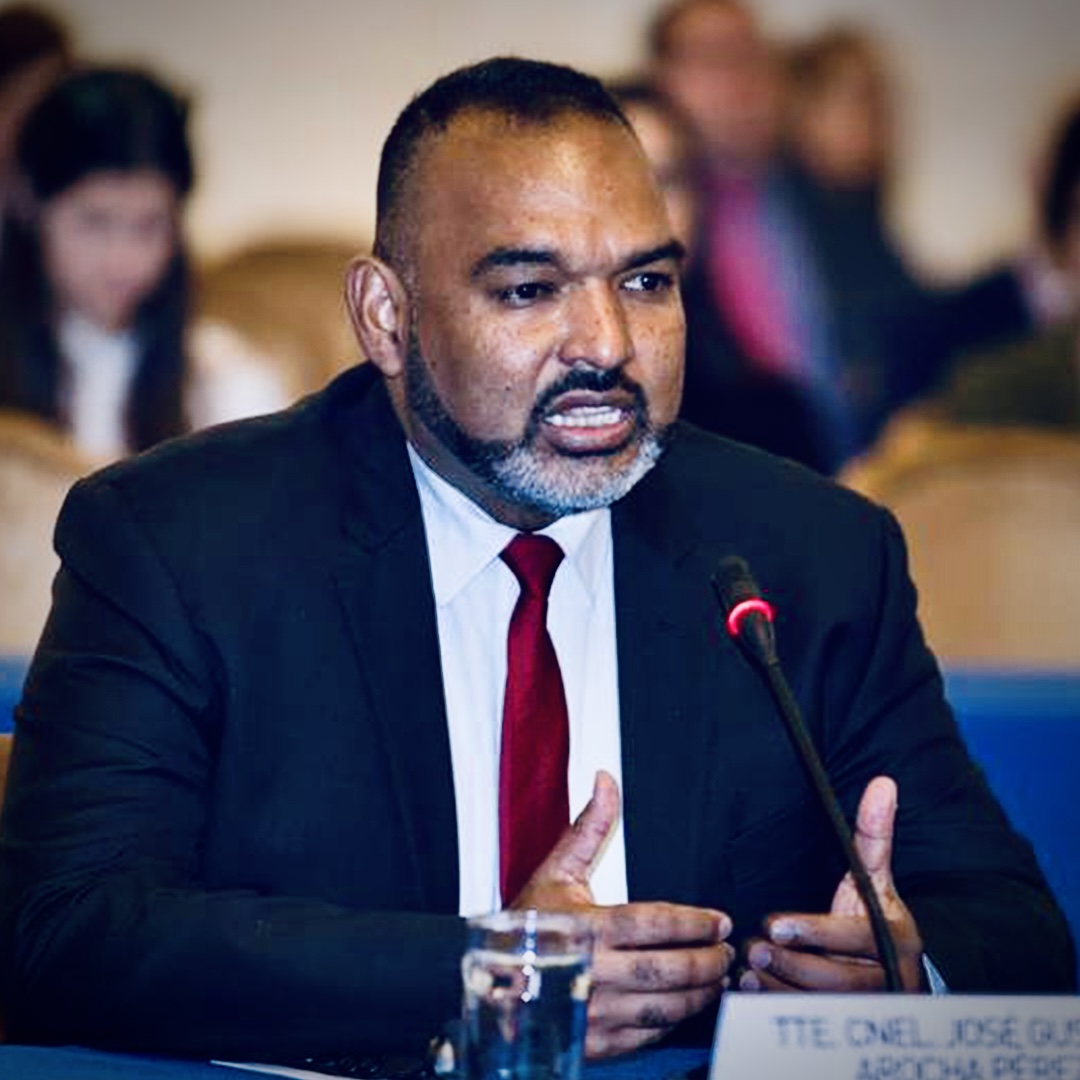 José Gustavo Arocha
José Gustavo Arocha